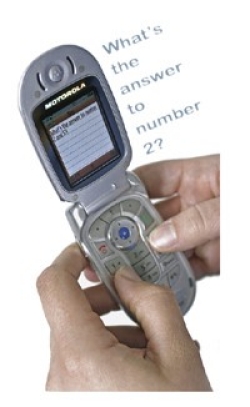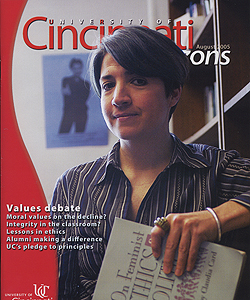Protecting academic integrity

Two students on opposite sides of the classroom are holding a silent conversation, distracting no one. Not even the professor notices as they trade cellular text messages about their evening plans. Outside of missing part of the day's lesson, what's the harm?
But change one detail: Same two students, same classroom, same technology. Only now they are swapping answers on a final exam.
Without a doubt, advances in wireless and global communication technology have enabled today's college student access to information and the ability to share that information in the blink of an eye.
It's 2 a.m., and that 10-page paper is due in the morning. For the procrastinating student who did not get off work till late at night, the dilemma is this: Stay focused and hammer it out, or comb the Internet for material to copy and paste.
Students are well aware of the vast technological temptations within their grasp, but how has the convenient access to info affected academic behavior? It depends on whom you ask.
High-tech cheating, coupled with traditional classroom subterfuge, has led to a bit of an epidemic on campuses nationwide, says Don McCabe, founder of the Center for Academic Integrity, a national consortium established in 1992. McCabe's research over the last three years says a quarter to half of all college students routinely engage in academic misconduct. His survey of more than 17,000 students from medium-size institutions last year revealed that 22 percent admitted to cheating on a test, while half 'fessed up to either plagiarizing or outright purchasing a paper online.
"Part of the increase points to the fact that students are more willing to attempt cheating when everybody does it," McCabe says. "Students concoct lots of reasons for why it's OK to cheat."
Ron Hundemer, an English composition and children's literature professor at the University of Cincinnati, engages his classroom in a conversation about cheating every year after they read an essay titled, "A Whole Lot of Cheating Going On."
Most of his students give similar reasons for the dishonest approach: They don't see any relevance to an assignment; it's a time waster or they just copy homework they don't understand. Hundemer, a former high school teacher, thinks the culture of cheating takes root before college. "For most of my high school students, it was just something natural, because that was the way society had become: borrow, borrow, borrow and not hold anyone accountable."
Holding cheaters accountable, however, is something UC's Daniel Cummins takes seriously. Director of University Judicial Affairs, Cummins is tasked with enforcing the university's Student Code of Conduct.
"The issue of academic integrity has been something that troubled and challenged many members of the UC community," Cummins says. "My colleagues and I were experiencing a lot of students who wanted to get the grade but did not want to put in the work. We were noticing students taking shortcuts."
Most instances of academic misconduct are handled through the code's first level of resolution; meaning jurisdiction falls to the professor to alter a grade for the assignment, examination or course.
To take matters further, students or professors bring issues to a college conduct administrator, who works as a liaison between colleges and Judicial Affairs. Cummins' office then convenes a hearing committee, which essentially puts the student on trial following an investigation. The committee can side with the student or recommend disciplinary action including academic probation, suspension or complete dismissal.
As of spring quarter, instructors reported 14 cases of academic dishonesty to Judicial Affairs during the 2004-05 school year, up 50 percent from last year. "I'm moving in a direction to get colleges to report cheating," he says. "Whatever the profession is, we want our students to be the best prepared academically and professionally."
The real key to stopping cheaters may be vigilance on the part of professors.
"I don't give students the opportunity to cheat," says College-Conservatory of Music professor Robin Riley who bars cheater-friendly gadgets from his classroom.
"I allow no electronic devices in my class, no headphones and no palm pilots, not even for taking notes. What's new is the method of cheating, increased by the technology and the portability of technology. Students are driven by the market and all the demands they're under."
In the history department there is a keen awareness that plagiarism is on the rise. "We've had folks who seem to be surprised that 'copy and pasting' is academic dishonesty," department head James Murray says. "I have the feeling that there is sloppy work at the secondary education level."
Murray teaches a class of 200 students and says monitoring student conduct is impossible at that size. "With 200 students, it's ridiculous," he says. "Police-state tactics will not take care of the problem. Dishonesty cannot be combated by professors; they would have to be a full-time police force."
Although McCabe's research shows faculty members nationwide do not want to be bothered by the formal process of nailing cheaters, there are plenty at UC who are willing to protect the integrity of their courses.
"I haven't gotten the sense that (faculty) are willing to give a break or look the other way or anything like that," says John Maddux, English and comparative literature assistant professor at UC. "The faculty members I've talked to, either informally or in meetings, are certainly going to pursue someone if they think they are plagiarizing or cheating."
Still, students bent on taking shortcuts will find ways, particularly in large auditoriums. One DAAP student pointed out how easy it is to pass information in her freshman lecture class, either by using America Online Instant Messenger or by simply passing notes. "A lot of people go into it knowing they will cheat, because they know they can," she says. Meanwhile, professors like Murray seem to have a quiet confidence that every cheater will have his or her day.
"If students are bound to cheat, they will get caught," he says, "but it's difficult to root it out of student culture."
Currently, students taking intro-level English courses are required to buy a course packet that contains information about academic dishonesty and what exactly constitutes plagiarism, says Maddux.
Both he and Hundemer require their students to do in-class writing sessions and responsive writings, so that in-class work can be compared to work turned in later. The strategy seems to work; neither professor has had a problem with plagiarism in any of his classes.
"In all my 16 years here, only a couple of times did I sincerely suspect a student of plagiarizing," says Maddux. "I'm aware that there may be students who fool me. I try to look for it, but I don't go overboard like some professors do."
Cheating inevitably boils down to a student's values. Mark Schmitt, a business senior, says he is routinely faced with the temptation to cheat, but consistently decides against it. "Part of it is if you do get caught, the rewards don't equal the punishment," he says. "You could fail the course and kill your GPA or get kicked out of the college completely."
He calls his decision a matter of pride, where even in a "borrow, borrow" society, people must live up to their own standards and inner integrity. "There is something to be said about making it on your own, doing it your own way, not needing somebody else's previous work and knowing that the grade you earned is your own."
Intern Jake Dirr is a junior in the A&S writing program.
Links:
UC's University Judicial Affairs office

 Past Issues
Past Issues